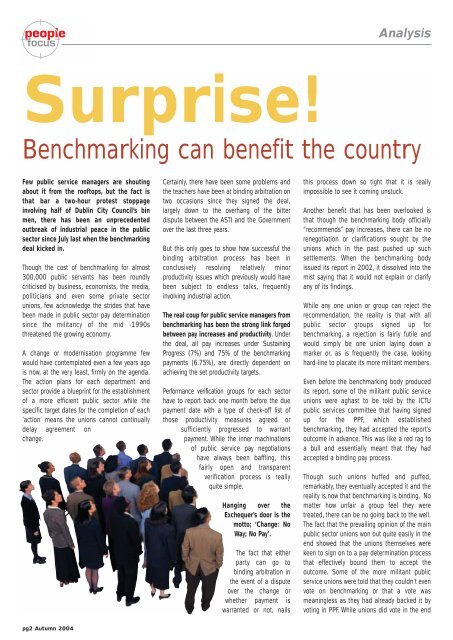People Focus Spring 04 NA - CIPD
People Focus Spring 04 NA - CIPD
People Focus Spring 04 NA - CIPD
- No tags were found...
You also want an ePaper? Increase the reach of your titles
YUMPU automatically turns print PDFs into web optimized ePapers that Google loves.
AnalysisSurprise!Benchmarking can benefit the countryFew public service managers are shoutingabout it from the rooftops, but the fact isthat bar a two-hour protest stoppageinvolving half of Dublin City Council’s binmen, there has been an unprecedentedoutbreak of industrial peace in the publicsector since July last when the benchmarkingdeal kicked in.Though the cost of benchmarking for almost300,000 public servants has been roundlycriticised by business, economists, the media,politicians and even some private sectorunions, few acknowledge the strides that havebeen made in public sector pay determinationsince the militancy of the mid -1990sthreatened the growing economy.A change or modernisation programme fewwould have contemplated even a few years agois now, at the very least, firmly on the agenda.The action plans for each department andsector provide a blueprint for the establishmentof a more efficient public sector while thespecific target dates for the completion of each’action’ means the unions cannot continuallydelay agreement onchange.Certainly, there have been some problems andthe teachers have been at binding arbitration ontwo occasions since they signed the deal,largely down to the overhang of the bitterdispute between the ASTI and the Governmentover the last three years.But this only goes to show how successful thebinding arbitration process has been inconclusively resolving relatively minorproductivity issues which previously would havebeen subject to endless talks, frequentlyinvolving industrial action.The real coup for public service managers frombenchmarking has been the strong link forgedbetween pay increases and productivity. Underthe deal, all pay increases under SustainingProgress (7%) and 75% of the benchmarkingpayments (6.75%), are directly dependent onachieving the set productivity targets.Performance verification groups for each sectorhave to report back one month before the duepayment date with a type of check-off list ofthose productivity measures agreed orsufficiently progressed to warrantpayment. While the inner machinationsof public service pay negotiationshave always been baffling, thisfairly open and transparentverification process is reallyquite simple.Hanging over theExchequer’s door is themotto; ‘Change: NoWay; No Pay’.The fact that eitherparty can go tobinding arbitration inthe event of a disputeover the change orwhether payment iswarranted or not, nailsthis process down so tight that it is reallyimpossible to see it coming unstuck.Another benefit that has been overlooked isthat though the benchmarking body officially“recommends” pay increases, there can be norenegotiation or clarifications sought by theunions which in the past pushed up suchsettlements. When the benchmarking bodyissued its report in 2002, it dissolved into themist saying that it would not explain or clarifyany of its findings.While any one union or group can reject therecommendation, the reality is that with allpublic sector groups signed up forbenchmarking, a rejection is fairly futile andwould simply be one union laying down amarker or, as is frequently the case, lookinghard-line to placate its more militant members.Even before the benchmarking body producedits report, some of the militant public serviceunions were aghast to be told by the ICTUpublic services committee that having signedup for the PPF, which establishedbenchmarking, they had accepted the report’soutcome in advance. This was like a red rag toa bull and essentially meant that they hadaccepted a binding pay process.Though such unions huffed and puffed,remarkably, they eventually accepted it and thereality is now that benchmarking is binding. Nomatter how unfair a group feel they weretreated, there can be no going back to the well.The fact that the prevailing opinion of the mainpublic sector unions won out quite easily in theend showed that the unions themselves werekeen to sign on to a pay determination processthat effectively bound them to accept theoutcome. Some of the more militant publicservice unions were told that they couldn’t evenvote on benchmarking or that a vote wasmeaningless as they had already backed it byvoting in PPF. While unions did vote in the endpg2 Autumn 20<strong>04</strong>
















